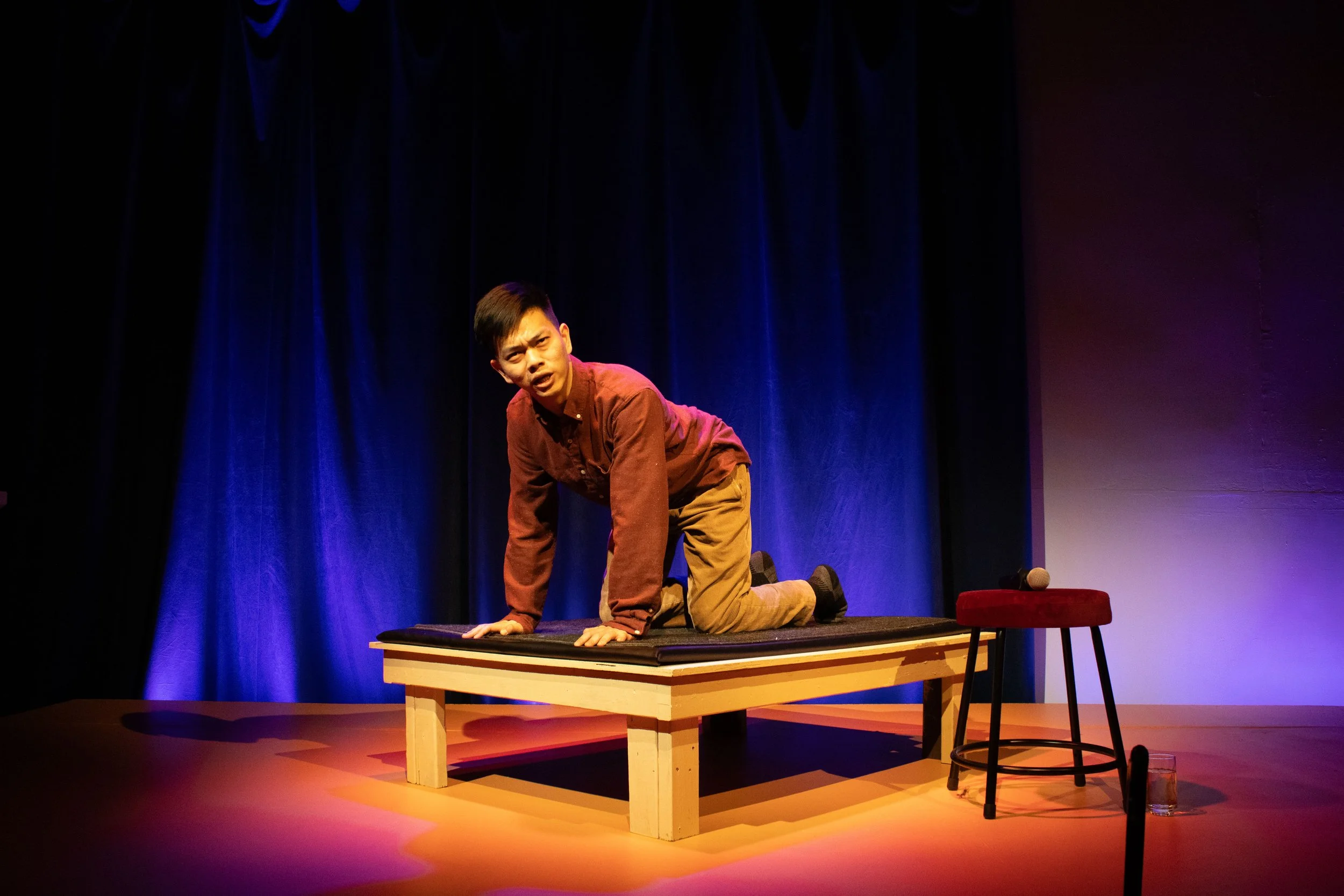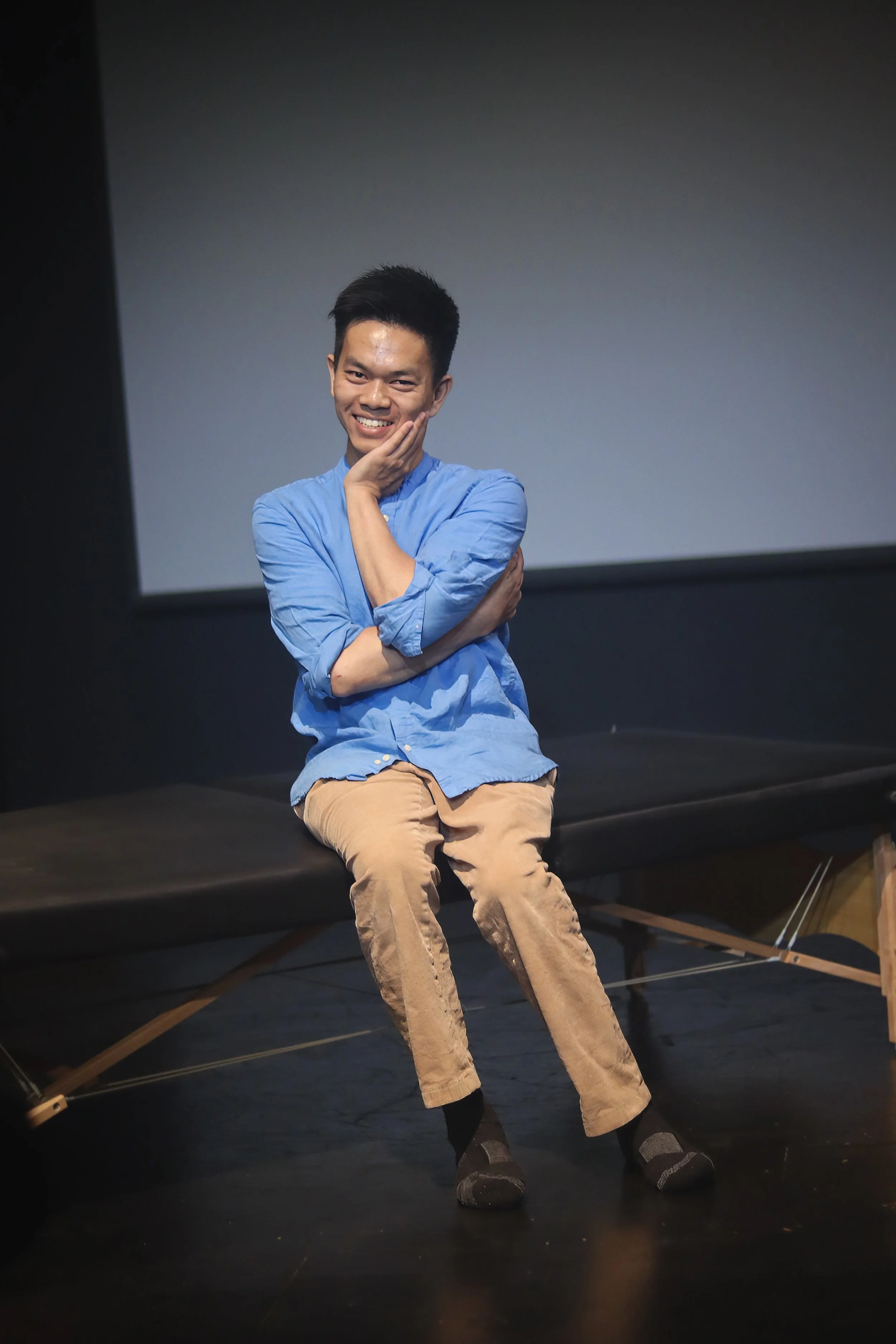Aaron Pang proves that truth is sexier than tropes
Responding to Falling: A Disabled Love Story by Aaron Pang
Aaron Pang in Falling: A Disabled Love Story | Photo credit: Aaron Pang
I am all too familiar with how disabled romances are usually portrayed: safe, sweet, and awkward. These are the kinds of stories that keep audiences comfortable but ultimately reduce disabled people to adorable archetypes, portrayed through a lens of pity or novelty. They represent the reality of how disabled people are perceived and policed every day. Shows like Love on the Spectrum, for instance, default to “cute,” packaging disabled love as endearing but unthreatening, while desire and sexuality are either infantilised or erased. Paradoxically, able-bodied people are still obsessed with speculating about the ethics of dating and what sex looks like for disabled people.
Falling: A Disabled Love Story by Aaron Pang isn’t your typical media portrayal of disabled romance. Rather, it’s a sharp, self-aware show that dismantles the “safe” narratives we’ve been fed, replacing them with something messier, funnier, and far more honest.
Pang, who uses a cane due to a spinal cord injury, looks at me early in the show and asks me if I would date him. “If you saw me in a bar with this, you could probably outroll me,” he says, acknowledging my wheelchair. The image of a drag race through a crowded club has us laughing, not just because it was brazenly ridiculous, but because it gently cuts through the unspoken tension. As a visibly disabled Woman of Colour in an audience largely unfamiliar with that perspective, the joke eases the dynamic between me and everyone else watching. When Pang throws the same question to the wider audience – “Would you date me?” – it carries a different meaning.
Aaron Pang in Falling: A Disabled Love Story | Photo credit: Aaron Pang
With a bit about dating bios and profile pictures, the shorthand of modern romance, we put our guard down. Pang tells a story of a young man’s first kiss with a music therapist during recovery from a motorcycle accident. It’s framed as tender, chaste, and we believe it because we’ve been conditioned to; the implausibility of a medical professional starting a romance with a teenage patient barely registers. It’s the kind of saccharine disabled romance we’ve seen so often on screen.
And then Pang reveals it was all a lie, a deliberate provocation to show how easily we accept an unrealistic but palatable script over something messier and more truthful.
If soft-focus romances are one side of the popular disabled narrative, then epic tragedies are the other. These are the sweeping, inspirational arcs that turn our lives into neat cautionary tales or redemptive journeys. Pang refuses to give us either. Disabled stories aren’t always epic tragedies and Pang refuses to turn his own experience into a neat trauma arc, or to centre Falling on the dramatic “how it happened” moment that audiences are so often hungry for.
Instead, the show plays with two ideas: getting off and getting away. “Getting off” explores the unexpected shapes of pleasure, addressing how disabled desire might not fit the glossy, conventional versions we are shown on screen but still carries the same charge. “Getting away” is more complicated, pointing to how disabled bodies are often read as harmless or asexual, sometimes letting us off the hook for social boundaries in ways that can feel like gifts or traps.
The show invites us to feel the tension between the thrill of wanting intimacy and the vulnerability of being seen as sexual, despite society’s reluctance to acknowledge it. That feeling, uncomfortably sexy, cracks open the polite narratives and forces us to reckon with disabled intimacy as something vibrant, complex, and unapologetically real.
In that space, Falling finds its power. It does not offer a neat, comforting ending but something more truthful in the ongoing negotiation of identity, desire, and connection in a world that would rather keep disabled bodies asexual or invisible. And that honesty, along with Pang’s dry humour, is exactly what makes this show memorable.
When Pang asks what kind of ending we want, “continued frustrations” or “new pleasures,” most hands go up for the feel-good option. He tells us we are the 23rd audience in a row to vote this way, and I get it – who doesn’t want a happy ending? The kind with a neat storybook fade-out, the comforting closure we’re all used to. Even after dismantling the idea of a convenient, familiar story of disability, the audience still clings to that network-approved happy ending that is safe enough to be broadcast and scrubbed clean of the messier, sexier truths of disabled intimacy.
The show asks us to confront discomfort, which is exactly where its power lies. For me, discomfort lies in the constant negotiation of how much to reveal or withhold in disabled dating, from recognising the power dynamics and the constant second-guessing. These moments are tense and unglamorous, rarely shown with such clarity in the mainstream media. Falling invites us into that uncomfortable space and makes it, undoubtedly, kind of sexy.
Discomfort is often where the most honest stories live. I hope more people get to sit in it, too.
Falling: A Disabled Love Story, Bunker Two at Pleasance Courtyard, 15:00, 30 Jul-25 Aug


